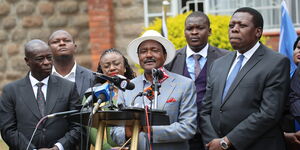The International Monetary Fund (IMF) has warned of a looming distress to electricity systems in Nairobi and other major cities owing to the rising temperatures.
In its technical assistance report on climate, the IMF cautioned that the demand for air conditioners and other cooling systems will rise in relation to the heat waves.
Consequently, an increase in the absorption of these equipment will cause distress to the power systems given that they run on electricity.
"While water scarcity and rainfall variation affect hydropower generation capacity, heat waves in urban centres like Nairobi or Mombasa could lead to higher demand for air conditioning and cooling, putting power systems under stress.
"In coastal areas, sea level rise and storm surge could inundate and damage water supply, electricity infrastructure, roads, and ports," read the report in part.
IMF explained that Kenya has been experiencing rising temperatures since the 19th century, with the conditions set to worsen soon.
"Annual mean temperatures in Kenya have risen steadily at 0.21 degrees Celsius per decade since the 1960s and are projected to increase by 1.9-3.2 degrees Celsius," read the report in part.
Notably, the city has been experiencing hot temperatures in recent weeks which is largely attributed to the effects of climate change.
The Kenya Meteorological Department during the week revealed that the temperatures would hit as high as 31 degrees Celsius in the city and its neighbouring counties.
Robert Ouma, a Kenya Meteorological Department official based at the University of Nairobi added that the heat wave may last until April this year.
Meanwhile, the IMF urged the government to undertake various measures to address climate change including the implementation of mitigation policies.
"Given future economic growth, closing infrastructure gaps while addressing climate mitigation challenges requires further transformation and major capital investments in key areas, as outlined in the Nationally Determined Contribution (NDC) and the NCAAP.
"This includes promoting low-emission public transport, increased penetration of electric vehicles, and supporting infrastructure, integration of various renewable sources with energy storage alongside grid infrastructure modernization, investing in energy-efficient buildings, and better infrastructure planning across urban and rural areas," read the report in part.












